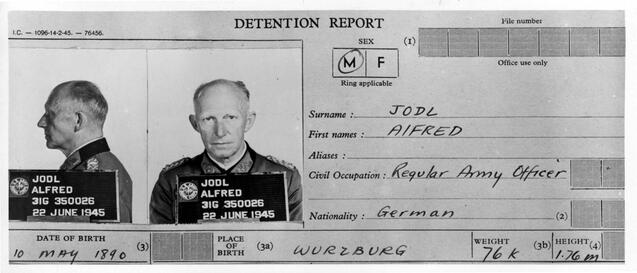
May 12, 1945: Keitel surrenders to the Allies.
From The Memoirs of Field Marshal Keitel: I was to surrender as a prisoner of war, and would be flown out at 2:00 that afternoon—in two hours time. I was to turn over my official business to Colonel-General Jodl; I was to be allowed to take with me one personal staff officer, a batman, and 300 lbs. of baggage. I stood up, saluted briefly with my Field Marshal's baton, and drove back to headquarters . . . . I took leave of Doenitz, who had already been briefed on what was to happen, and selected Lieutenant-Colonel John von Freyend, and Monch, to accompany me, thereby ensuring a considerably less arduous captivity for them. I handed my personal papers and keys to Jodl, and handed Szimonski ... one or two things and a letter for my wife, which were to be flown down to Berchtesgaden in the courier plane.
Unfortunately, the British later seized everything ... even my ... bank passbook, and the letter to my wife. We took off for a destination not disclosed to us and, after flying right across Germany, landed that evening in Luxembourg airport; there I was treated as a prisoner-of-war for the first time, and taken to the internment camp in the Palace Hotel, Mondorf, where Seyss-Inquart had already arrived. In Flensburg, I had been my own master; I drove to the airfield in my own car; in those two unguarded hours, I could have put an end to my life, and nobody could have stopped me. The thought never occurred to me, as I never dreamed that such a 'via dolorosa' lay ahead of me, with this tragic end in Nuremberg.
May 23, 1945: British tanks enter Flensburg, Germany, where the British find and arrest Doenitz, Rosenberg, Speer, Jodl, and his second adjutant, Major Herbert Buchs.
June 5, 1945: The Allies divide up Germany and Berlin, and take over the government.
June 7, 1945: Justice Jackson sends off a progress report to President Truman:
June 7, 1945: Jodl is interviewed by the US Strategic Bombing Survey:
[As to] the question of negotiations, I can only say that the government of that time could not negotiate at all, because it had been told, quite [definitely from] all sides, [that] the war would have to end with unconditional surrender, or, in the long run, with the extermination of everything German. Therefore, the prerequisites for negotiations as they existed, in previous wars, when one could say "We have lost and lower our swords, we surrender you a province," were not given in this war. Negotiations were therefore out of the question. The political leaders, therefore, would have only had the alternative of simply putting a bullet through their own heads. (SBS)
June 21, 1945: During a joint US-UK conference, Sir David Maxwell-Fyfe presents a list of ten defendants for consideration. Chosen mainly because their names are well known to the public, they are assumed to be criminals; little effort has yet to be made to determine the actual evidence that will be available against them. The initial ten: Göring, Hess (though the British warned that he was possibly insane), Ribbentrop, Ley (see October 25, 1945, below), Keitel, Streicher, Kaltenbrunner, Rosenberg, Frank and Frick. (Taylor)
June 26, 1945: The United Nations Charter is signed in San Francisco.
June 26, 1945 International Conference on Military Trials: From the minutes of this day's Conference Session:
Mr. Roberts: May I say that it is our view, too. We would like to draft some rules, by agreement, although we quite understand that the Tribunal will have the power to modify or extend those rules; but we share the Russian fear that this paragraph, as it is, might lead to duplication and delay.
Niktchenko: This is a change we can discuss in a memorandum, but we could leave the text as it stands now, in the statute, and arrange that when necessary. The Tribunal may later elaborate or extend.
Justice Jackson: I assume you mean that a memorandum will be prepared by the Soviet that will indicate the type of rules that you think should be incorporated. We do not object to adding any rules we feel should be incorporated as we go along...
July 1, 1945: US, British, and French occupying forces move into Berlin.
July 7, 1945: US Supreme Court Associate Justice Robert Jackson visits a city 91% destroyed by Allied bombs: Nuremberg. He inspects the Palace of Justice, and decides to recommend it as a site for the upcoming trials, even though the Soviets much prefer that the trials take place in Berlin, within their own zone of occupation. (Conot, Tusa, Maser)
July 7, 1945: Jodl is again interviewed by the US Strategic Bombing Survey:
In 1942, however, during the summer campaign in Russia, I personally became convinced that the Führer was not making sound decisions. I believe that the reason for it was the hot continental climate, which he could not stand. He complained of constant headaches, and so it occurred that he would give orders and, the next day, after they were carried out to the letter, he would bawl out the General Staff for having done what he had ordered. This went so far that I had Schreff write down what he ordered every day, and what the General Staff carried out, so as to prove that all that happened through my decisions was exactly what he had ordered. That led to conflicts between [us] up until August 1942, when he decided to call in the stenographers, in order to have a proof on his side of what he had ordered. I do believe that, at this time, his leadership was bad . . . .
I cannot consider [not invading England] a mistake because, at the time, I gave him a situation appraisal, in which I advised against it . . . . In the course of the latter years, there were naturally decisions taken in the East which are hard to understand, and which cannot be justified from a purely military point of view. It had been proved in the early years of the war, that he had frequently been right, when the General Staff was wrong, and this served to increase his mistrust of our advice later on. When the retreat from the East was suggested by the OKW, he opposed it because he believed that it was just another sign of weakness and excessive conservatism. He had too little immediate contact with the troops, and so some of his decisions in the latter period were not based on military reality.
But, looking at the whole picture, I am convinced that he was a great military leader. Certainly no historian could say that Hannibal was a poor general just because, in the end, Carthage was destroyed. It was clear, from the moment he took over the Supreme Command, that what he most lacked was the experience of a long military career, through all the grades to the top. You can only learn by experience. He took part in the trench warfare in the last war, and he mastered that form of warfare outstandingly; but he had no real experience in mobile warfare and all the difficulties that are caused in communications with the uncertain conditions of mobile warfare. [Therefore, he] tended to overlook the difficulties of executing some of the operations that he had planned. (SBS)
July 16, 1945: Since May, the Allies have been collecting Nazis, and tossing the high-ranking ones into a former hotel in Mondorf, Luxembourg, affectionately referred to as "Ashcan." On this day, Ashcan's commander, Colonel Burton C. Andrus, takes representatives of the world's Press on a tour of the facility, to quash the rumors that the prisoners are living the high-life. "We stand for no mollycoddling here," Andrus proclaims. "We have certain rules and the rules are obeyed ... they roll their own cigarettes."
July 16, 1945: First US atomic bomb test; the Potsdam Conference begins. (Tusa)
July 17, 1945 International Conference on Military Trials: From the minutes of this day's Four Power conference session:
July 19, 1945 International Conference on Military Trials: From the minutes of today’s Conference Session:
July 21, 1945: Justice Jackson returns to Nuremberg [with British and French representatives], to inspect possible housing accommodation. (Conot, Tusa)
July 25, 1945 International Conference on Military Trials: During this day's Four Power conference session:
July 31, 1945 From the letters of Thomas Dodd, Executive Trial Counsel for the Prosecution at Nuremberg:
The English appointed their chief counsel 21 days after the US appointed Jackson (who was the first to be appointed). The French followed soon after. Thus far no one has been appointed for Russia. Our people meet with certain Russian representatives, but nothing happens. When representatives of the United Nations went to Nuremberg, to look it over as a possible site for the trial, only the Russians failed to make the trip.
August 1, 1945 Potsdam Conference: At the Twelfth Plenary Session, the subject of trying Nazi war criminals is raised:
Stalin: Perhaps we could name fewer persons, say three.
Bevin: Our jurists take the same view as the Americans.
Stalin: And ours take the opposite view. But perhaps we shall agree that the first list of war criminals to be brought to trial should be published not later than in one month...
August 2, 1945 International Conference on Military Trials: During this day's Four Power conference session:
Lord Chancellor: In an English or American trial, after a witness has given testimony for the Prosecution, he can be questioned by the defense, in order that the defense may test his evidence, verify his evidence, to see whether it is really worthy of credit. In our trials, the defendant or his counsel is always entitled to put questions in cross-examination. And I think the same situation prevails in the courts of France.
Judge Falco: Yes, the same.
General Niktchenko: According to Continental procedure, that is very widely used too. The final form would be then, "The Defendant shall have the right to conduct his own defense before the Tribunal, to cross-examine any witness called by the Prosecution ...
August 8, 1945: The London Agreement is signed. The Soviets declare war on Japan and invade Manchuria.
August 12, 1945: Colonel Andrus and his 15 Ashcan prisoners are loaded onto a US C-47 transport plane bound for Nuremberg. As they fly above Germany, Goering continually points out various geographical features below, such as the Rhine, telling Ribbentrop to take one last look as he is unlikely to ever get the opportunity again. Streicher becomes air-sick. (Tusa)
August 12, 1945: Justice Jackson releases a statement to the American press:
August 14, 1945 From the letters of Thomas Dodd:
August 18, 1945 From the letters of Thomas Dodd:
Jodl said: 'We had the plans ready—we could have taken Gibraltar easily.' He told us that no one knew of Italy's plan to invade Greece. Hitler heard of it the day it started—when he met Mussolini at Florence. As Hitler stepped from his plane, Mussolini greeted him with the news. Hitler and the German generals were furious. Oh! I could write pages on all this. Jodl said: "After all, Hindenburg was right when he said, 'Even Mussolini can do no more than make Italians out of Italians.'" When did Jodl realize the war was lost? "I first thought it possible that we could lose, in 1942. I felt quite sure, after the Americans landed in Normandy. I was positive, after the Americans crossed the Remagen bridge on the Rhine." Of course, it is only one side of this I feel sure—these professional German militarists respected Hitler. They say he really ran the war! To hear Jodl tell of his last hours with Hitler is moving--if not anything else.
August 25, 1945: Representatives of the Big Four (Jackson, Fyfe, Gros, and Niktchenko), agree on a list of 22 defendants (from the original list of 122), 21 of whom are in custody, including Jodl. The 22nd, Martin Bormann, is presumed to be in Soviet custody, but Niktchenko cannot confirm it. The list is scheduled to be released to the Press on October 28. (Conot)
August 28, 1945: Just in time to stop the release of the names of the 22, Niktchenko informs the other three Allied representatives that, unfortunately, Bormann is not in Soviet custody. However, he announces that the valiant Red Army has captured two vile Nazis: Erich Raeder, and Hans Fritsche, and offers them up for trial. Though neither man was on anyone's list of possible defendants, it emerges that their inclusion has become a matter of Soviet pride; Raeder and Fritsche being the only two ranking Nazis unlucky enough to have been caught in the grasp of the advancing Russian bear. (Conot)
August 29, 1945: The final list of defendants is released to the press. Bormann, though not in custody, is still listed; Raeder and Fritsche are now included, though there is no longer a Krupp represented. (Conot)
August 29, 1945: The Manchester Guardian reacts to the release of the list of defendants:
August 30, 1945 From the letters of Thomas Dodd:
For example, Keitel, Hitler, and Jodl were in Hendaye, France, in conference with Petain, when word reached them that Italy was about to attack Greece. They immediately left for Florence, and arrived the next morning at 6 AM. Mussolini greeted them by announcing that he had invaded Greece. Hitler was wild. So was Keitel—and of course Mussolini was cocky. Keitel said: "How can you defeat the Greeks?" Mussolini said, "There will be no battles—Ciano has bought up the opposition with a little gold." Hitler told Keitel once, "I never tell Mussolini anything important, for what Mussolini knows, Ciano knows, London knows, and Washington knows."
About the Finns: Keitel and Jodl met with the Finnish Chief of Staff at Salzburg, in May of 1941. They made a proposal to the Finns; Keitel said, "The Finns gave us their answer with action—they were brave soldiers--our most faithful allies. They never asked for anything, and they desired only to preserve their country."
August 30, 1945: The Glasgow Herald reacts to the release of the list of defendants: Scanning this list, one cannot but be struck by the completeness of the Nazi catastrophe. Of all these men, who but a year ago enjoyed wide influence or supreme power, not one could find a refuge in a continent united in hate against them.
September 2, 1945: Victory over Japan Day.
September 5, 1945: Justice Jackson meets with President Truman, who proposes naming former attorney general Francis Biddle as the American judge at Nuremberg. Jackson, who does not think highly of Biddle, suggests alternatives. Biddle will ultimately get the appointment. (Conot, Tusa)
September 17, 1945 From the letters of Thomas Dodd:
September 23, 1945 From the letters of Thomas Dodd:
For example, he knows a lot about Keitel, and Jodl, and those who were associated with them. He confirms my opinion of Keitel—i.e., a stupid opportunist, with enough cunning to hold a job. But he surprised me when he said Jodl wasn't the brains either—instead General (Walther) Warlimont, a member of Hitler's personal staff. Scheidt said there was considerable friction between Keitel and Jodl on one side, and Warlimont on the other, and largely because Warlimont was a strict Catholic, and Keitel and Jodl did not profess any faith. Scheidt tells me that he has some authentic papers hidden away. One is a memorandum on the fight within the German Army to resist Hitler. I am taking steps to find these at once.
September 26, 1945 From the letters of Thomas Dodd:
October 5, 1945: Andrus loses his first German prisoner to suicide; Dr. Leonard Conti, Hitler's 'Head of National Hygiene.' (Conot, Tusa)
October 8, 1945 From the letters of Thomas Dodd:
October 10, 1945 From the letters of Thomas Dodd:
October 14, 1945: British representative Sir Geoffrey Lawrence is elected President of the IMT (International Military Tribunal). (Conot, Tusa)
October 19, 1945: British Major Airey Neave presents each defendant in turn with a copy of the indictment. (Conot, Maser, Tusa)
October 25, 1945: Andrus loses yet another Nazi, as the defendant Dr. Robert Ley, Hitler's corrupt head of the German Labor Front (Deutsche Arbeitsfront, DAF), commits suicide in his Nuremberg cell. (Tusa)
1945: Prior to the trial, the defendants are given an IQ test. Administered by Dr. Gilbert, the Nuremberg Prison psychologist, and Dr. Kelly, the psychiatrist, the test includes inkblots, and the Wechsler-Bellevue test. Jodl scores 127. Note: After the testing, Gilbert comes to the conclusion that all the defendants are "intelligent enough to have known better." Andrus is not impressed by the results: "From what I've seen of them as intellects and characters I wouldn't let one of these supermen be a buck sergeant in my outfit." (Tusa)
November 19, 1945: After a last inspection by Andrus, the defendants are escorted, handcuffed, into the empty courtroom and given their assigned seats. (Conot, Tusa)
November 19, 1945 Nuremberg Tribunal: The day before the opening of the trial, a motion is filed on behalf of all defense counsel:
November 20, 1945 Nuremberg Tribunal: On day 1 of the historic trial, the prosecutors take turns reading the indictment in court. Unfortunately, no one had given any thought to the prisoners' lunch break, so, for the first and only time during 218 days of court, the defendants eat their midday meal in the courtroom itself. This is the first opportunity for the entire group to mingle, and though some know each other quite well, there are many who have never met.
November 21, 1945 Nuremberg Tribunal: On day 2, the defendants enter their pleas: The President: I will now call upon the defendants to plead guilty or not guilty to the charges against them. They will proceed in turn to a point in the dock opposite to the microphone ... Jodl: Not guilty. For what I have done or had to do, I have a pure conscience before God, before history and my people.
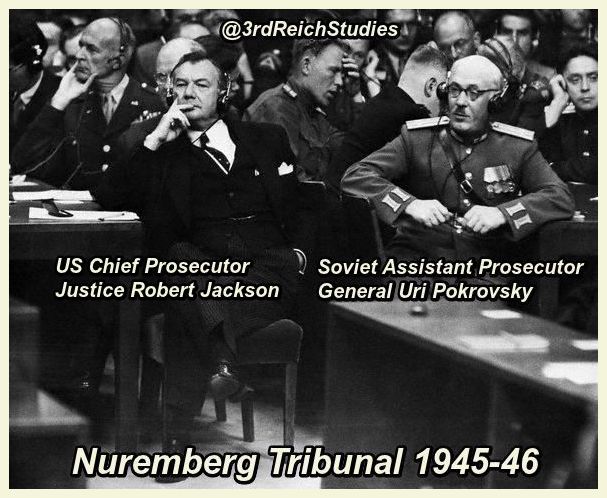
November 21, 1945 Nuremberg Tribunal: Immediately following the pleas of the defendants, Justice Jackson delivers his opening statement:
November 29, 1945 Nuremberg Tribunal: On day 8, the Prosecution presents as evidence a film shot by US troops as they were liberating various German concentration camps.
November 29, 1945: Jodl writes his wife:
November 30, 1945 Nuremberg Tribunal: On day 9, prosecution witness Erwin Lahousen is examined:
Lahousen: Yes; he is in the second row, next to Herr von Papen.
Colonel Amen: Now, to the best of your knowledge and recollection, will you please explain, in as much detail as possible, to the Tribunal, exactly what was said, and what took place at this conference in the Führer's train?
Lahousen: Hitler and Jodl entered, either after the discussions I have just described, or, towards the conclusion of the whole discussion of this subject, when Canaris had already begun his report on the situation in the West; that is, on the news which had meanwhile come in on the reaction of the French Army at the West Wall.
Colonel Amen: And what further discussions took place then?
Lahousen: After this discussion in the private carriage of the Chief of the OKW, Canaris left the coach, and had another short talk with Ribbentrop, who, returning to the subject of the Ukraine, told him once more that the uprising should be so staged, that all farms and dwellings of the Poles should go up in flames, and all Jews be killed...
December 1, 1945 Nuremberg Tribunal: On day 10, during cross-examination of prosecution witness Erwin Lahousen by Goering’s defense counsel:
The President: The Tribunal will consider the point you have raised and will let you know later.
Justice Jackson: The United States Prosecution would desire to be heard, I am sure, if there were any probability of that view being taken by the Tribunal.
The President: Perhaps we had better hear you now, Mr. Justice Jackson.
Justice Jackson: Well, I think it is very clear that these provisions are mutually exclusive. Each defendant has the right to conduct his own defense, or to have the assistance of counsel. Certainly, this would become a performance, rather than a trial if we go into that sort of thing. In framing this Charter, we anticipated the possibility that some of these defendants, being lawyers themselves, might conduct their own defenses. If they do so, of course, they have all the privileges of counsel. If they avail themselves of the privileges of counsel, they are not, we submit, entitled to be heard in person.
Dr. Stahmer: I would like to point out once more that Paragraph 16 (e), according to my opinion, speaks very clearly for my point of view. It says that the defendant has the right, either personally, or through his counsel, to present evidence; and according to the German text, it is clear that the defendant has the right to cross-examine any witness called by the Prosecution. According to the German text, therefore, reference can be made only to the defendant, with respect to terms as well as to the contents. In my opinion, it is made clear that the defendant has the right to cross-examine any witness called by the Prosecution...
From The Arms of Krupp by William Manchester: To Germans of the war generation, the name Nuremberg is synonymous with disgrace—disgrace because the city cradled National Socialism, the dream which betrayed them, and because there the enemy imposed foreign justice upon them. Anglo-Saxon legal procedure was adopted for the trials, a decision which, defense counsel rightly protested, put them at a disadvantage.
Frankfurt's Die Neue Zeitung skillfully summed up the handicaps which the accused men faced. They were accustomed to a continental courtroom, whose judge held the defendant's record in his hands, was acquainted with every detail of the police investigation, was under legal obligation to trust an official's word more than that of a private citizen, and had the power to prevent cross-examination. Now all that was turned round. The judges listened, while prosecutors and defense lawyers led the proceedings. Defendants were considered innocent until proven guilty. Only what was said in court under oath counted.
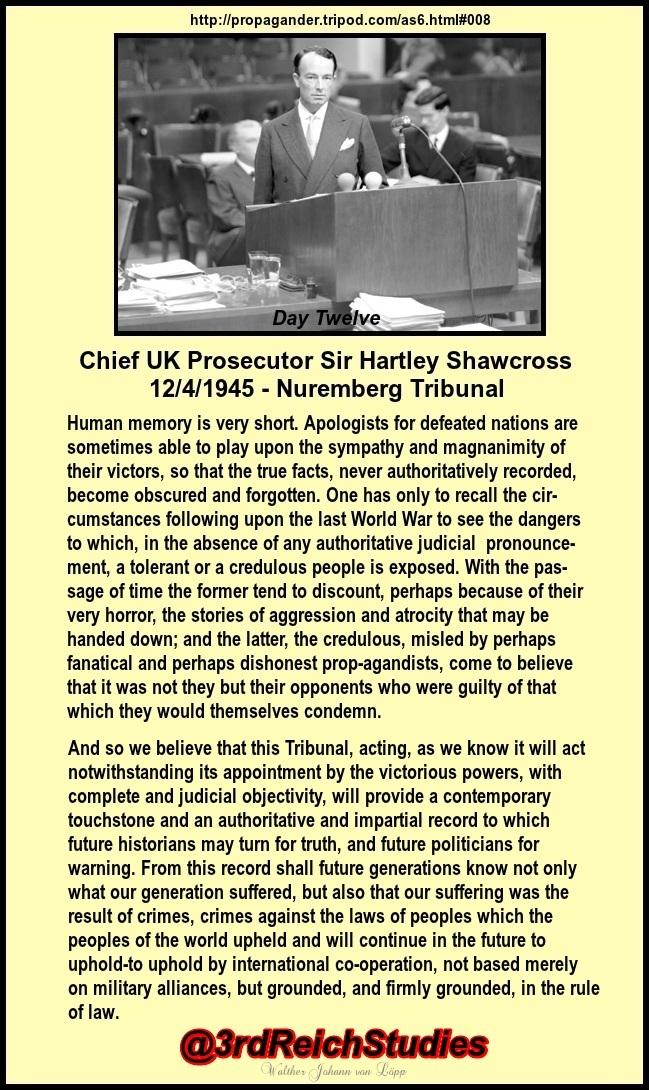
December 4, 1945 Nuremberg Tribunal: Day 12: Sir Hartley Shawcross, Chief Prosecutor for the United Kingdom, delivers his opening statement:
There are those who would perhaps say that these wretched men should have been dealt with summarily without trial, by "executive action"; that their power for evil broken, they should have been swept aside into oblivion without this elaborate and careful investigation into the part which they played in bringing this war about: Vae Victis! [Latin for "woe to the vanquished”] Let them pay the penalty of defeat. But that was not the view of the British Government. Not so would the rule of law be raised and strengthened on the international as well as upon the municipal plane; not so would future generations realize that right is not always on the side of the big battalions; not so would the world be made aware that the waging of aggressive war is not only a dangerous venture but a criminal one...
December 11, 1945 Nuremberg Tribunal: On day 17 the Prosecution presents as evidence a four-hour movie, 'The Nazi Plan,' compiled from various Nazi propaganda films and newsreels. Far from viewing the film as another nail in their coffins, the defendants enjoy it hugely. From the diary of Dr. Victor von der Lippe:
December 11, 1945 Nuremberg Tribunal: Following the viewing of the film, Mr. Thomas J. Dodd, Executive Trial Counsel for the United States, presents the case concerning the Exploitation of Forced Labor:
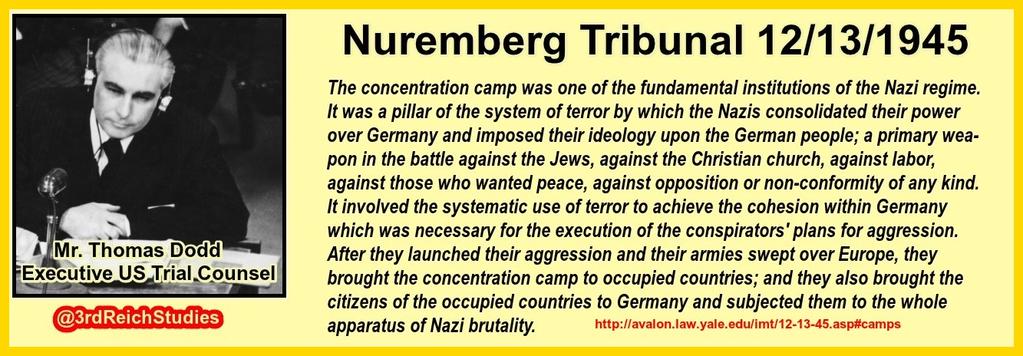
December 13, 1945 Nuremberg Tribunal: The Prosecution introduces grisly evidence from Buchenwald concentration camp, including the head of an executed Pole, used as a paperweight by Commandant Karl Koch, and tattooed human skin allegedly favored by the commandant's wife for use in lampshades and other household furnishings.
December 14, 1945 Nuremberg Tribunal: The tendency of some of the defendants to denounce, or at least criticize, Hitler on the stand, leads to an outburst by Göring during lunch: "You men knew the Führer. He would have been the first one to stand up and say "I have given the orders and I take full responsibility." But I would rather die ten deaths than to have the German sovereign subjected to this humiliation." Keitel fell silent, but Frank was not crushed: "Other sovereigns have stood before courts of law. He got us into this." Keitel, Doenitz, Funk, and Schirach suddenly get up and leave Göring's table." (Tusa)
December 20, 1945 Nuremberg Tribunal: After this day's session, the trial adjourns until Wednesday, 2nd of January, for a Holiday break.
December 23, 1945 Nuremberg Tribunal: Many of the defendants, most of whom are Protestant, attend Christmas Eve services, conducted by Pastor Gerecke.
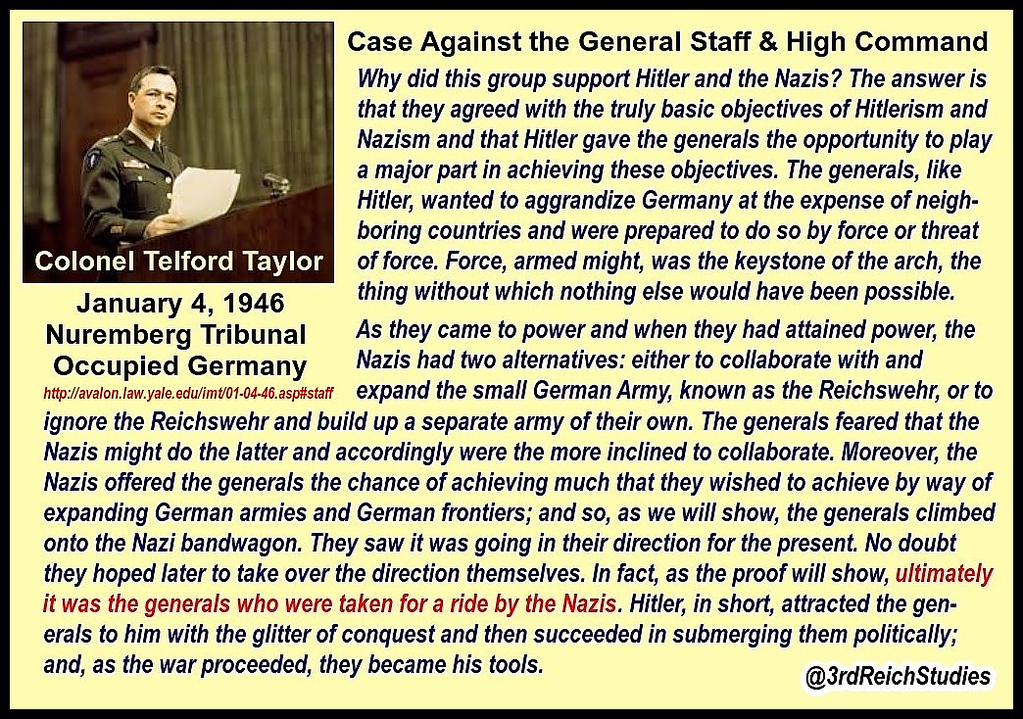
January 4, 1946 Nuremberg Tribunal: Day 27; Beginning of Colonel Telford Taylor's Presentation of the Case against the General Staff and the High Command:
As they came to power, and when they had attained power, the Nazis had two alternatives: either to collaborate with, and expand, the small German Army, known as the Reichswehr, or to ignore the Reichswehr and build up a separate army of their own. The generals feared that the Nazis might do the latter, and accordingly were the more inclined to collaborate. Moreover, the Nazis offered the generals the chance of achieving much that they wished to achieve by way of expanding German armies and German frontiers; and so, as we will show, the generals climbed onto the Nazi bandwagon. They saw it was going in their direction for the present. No doubt they hoped later to take over the direction themselves. In fact, as the proof will show, ultimately it was the generals who were taken for a ride by the Nazis...
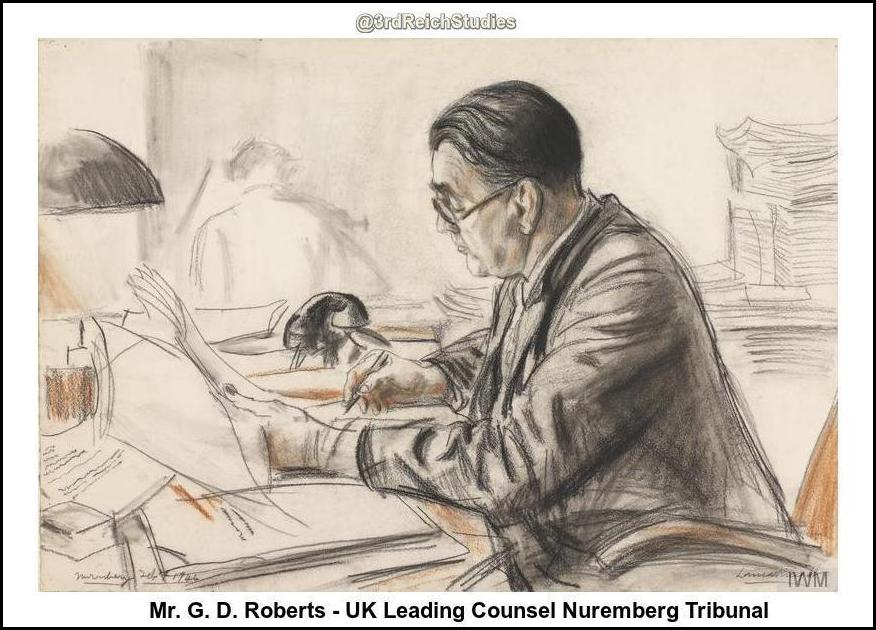
January 9, 1946 Nuremberg Tribunal: On day 30, British prosecutor Mr. Roberts presents evidence:
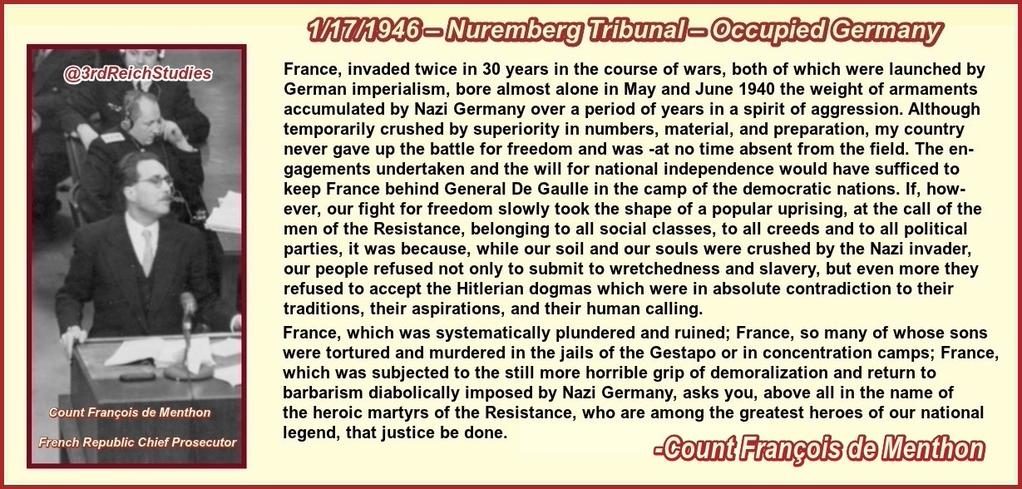
January 17, 1946 Nuremberg Tribunal: On day 36 the Chief Prosecutor for the French Republic, M. Francois De Menthon, presents the case for France:
If, however, our fight for freedom slowly took the shape of a popular uprising, at the call of the men of the Resistance, belonging to all social classes, to all creeds and to all political parties, it was because, while our soil and our souls were crushed by the Nazi invader, our people refused not only to submit to wretchedness and slavery; but even more, they refused to accept the Hitlerian dogmas, which were in absolute contradiction to their traditions, their aspirations, and their human calling...
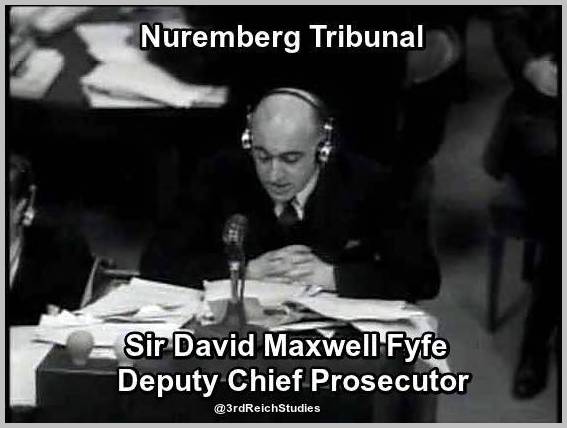
January 28, 1946 From the diary of the British Alternate Judge, Mr. Justice Birkett:
February 7, 1946 Nuremberg Tribunal: On day 53, the French Prosecution presents its case:
Consequently, it is possible that, in certain cases, he may consciously do evil while remaining convinced that his act is irreproachable from the moral point of view. The second concept is that, according to the law of National Socialist ethics, sometimes put into words by certain National Socialist leaders, that which promotes the interests of the Party is good; that which does not promote the interests is evil...
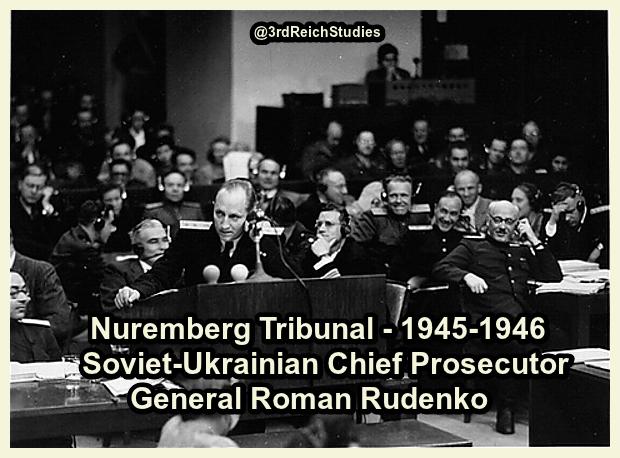
February 8, 1946 Nuremberg Tribunal: Göring, who, along with Hess, had removed his earphones in disgust during Rudenko's presentation, declares during the lunch break: "I did not think that they (the Russians) would be so shameless as to mention Poland." And later: "You will see—this trial will be a disgrace in 15 years." (Gilbert)
February 9, 1946 From the letters of Thomas Dodd:
February 11, 1946 From the diary of Dr. Victor von der Lippe:
February 11, 1946 Nuremberg Tribunal: On day 56, the Russians present a surprise witness, Field Marshal von Paulus, who had surrendered at Stalingrad.
Paulus: May I please have the question repeated?
General Rudenko: I repeat the question.
The President: The Tribunal is about to address an observation to General Rudenko. The Tribunal thinks that a question such as you have just put, as to who was guilty for the aggression upon Soviet territory, is one of the main questions which the Tribunal has to decide, and therefore is not a question upon which the witness ought to give his opinion. Is that what Counsel for the Defense wish to object to?
Dr. Laternser: Yes, Mr. President. That is what I want to do.
General Rudenko: Then perhaps the Tribunal will permit me to put this question rather differently.
The President: Yes.
General Rudenko: Who of the defendants was an active participant in the initiation of a war of aggression against the Soviet Union?
Paulus: Of the defendants, as far as I observed them, the top military advisers to Hitler. They are the Chief of the Supreme Command of the Armed Forces, Keitel; Chief of the Operations Branch, Jodl; and Göring, in his capacity as Reich Marshal, as Commander-in-Chief of the Air Forces and as Plenipotentiary for Armament Economy.
General Rudenko: In concluding the interrogation I shall make a summary. Have I rightly concluded from your testimony that, long before 22 June, the Hitlerite Government and the Supreme Command of the Armed Forces were planning an aggressive war against the Soviet Union, for the purpose of colonizing the territory of the Soviet Union?
Paulus: That is beyond doubt...
February 11, 1946 Nuremberg Tribunal: From Nuremberg Diary by Gustave Gilbert:
February 12, 1946 Nuremberg Tribunal: On day 57 of deliberations, prosecution witness von Paulus is cross-examined by various defense counsel:
Dr. Nelte: Field Marshal Paulus, you do not seem to know that you also belong to the circle of the defendants, because you belonged to the organization of the High Command which is indicted here as criminal.
Paulus: And, therefore, since I believe that I am here as witness for the events which have led to the indictment of these defendants here, I have asked to be relieved of answering this question which concerns myself.
Dr. Nelte: I ask the Tribunal to decide.
The President: The Tribunal considers that you must answer the questions...
February 12, 1946 From the letters of Thomas Dodd:
February 15, 1946 Nuremberg Tribunal: From the diary of the British Alternate Judge, Mr. Justice Birkett:
February 15, 1946 Nuremberg Tribunal: Colonel Andrus tightens the rules for the defendants by imposing strict solitary confinement. This is part of a strategy designed to minimize Göring's influence among the defendants. (Tusa)
February 22, 1946 Nuremberg Tribunal: In a further move to minimize his influence, Göring is now required to eat alone during the court's daily lunch break. The other defendants are split up into groups, with Jodl dining with Kaltenbrunner, Rosenberg, and Frick. (Tusa)
March 5, 1946: Winston Churchill (now a private citizen) introduces the phrase Iron Curtain into the English language during his famous Cold War speech at Fulton, Missouri. Speer recorded his fellow defendants' reactions:
March 8, 1946 Nuremberg Tribunal: Day 77, General Erhard Milch testifies for the defense:
Dr. Laternser: In all other cases, therefore, it was rather a surprise to the high military leaders?
Milch: Yes, a complete surprise.
Dr. Laternser: Now I have one more question: What was the possibility of resignation for high military leaders during the war?
Milch: That has been told several times. I have also experienced it myself—one was not permitted to hand in one's resignation. It was said if there was a reason for anyone to leave, he would be informed by his superiors. In an authoritarian state the subordinate, the citizen has no right to resign on his own initiative, whether he be a soldier or a civilian...
March 11, 1946 Nuremberg Tribunal: On day 78, General Erhard Milch continues his testimony:
Milch: I fully agree with you, if a soldier breaks his word in matters that are his province and where he has a say as a soldier. As regards matters quite outside his province, which he cannot judge, and about which he knows nothing, he cannot be made responsible and called to account.
Mr. Roberts: You can only speak for your own knowledge. Are you saying that you did not know that your country was pledged to observe the neutrality of these three small countries?
Milch: That I have read in the Reichstag speech. But I did not know how the other side had reacted to that promise. I did not know it, and it could easily be that the other side did not at all want this protection, or this promise, or this guarantee. The soldier could not judge this at all; only the political authorities could know this.
Mr. Roberts: Well, we perhaps will have to ask that of the soldiers in the High Command, who are now in the dock, when they get in the witness box. But I put it to you: it must have been common knowledge in Germany that Hitler was giving guarantees and assurances to all these smaller countries?
Milch: Hitler proposed and offered many things. He offered limitations of armaments for all countries; he offered not to use bombers; but in these cases also, his proposals were not accepted. Therefore, the political authorities alone could know what they should and could demand from their soldiers. The only duty of a soldier is to obey...
March 12, 1946 Nuremberg Tribunal: On day 79, Albert Kesselring testifies for Goering's defense:
Kesselring: That must be admitted. On the other hand, I found him—I do not know why—understanding in most of the matters I put to him.
Dr. Jahrreiss: Did you yourself settle these differences of opinion with Hitler?
Kesselring: In critical cases Colonel General Jodl called me in, if he could not carry his point.
Dr. Jahrreiss: If you could not carry the point?
Kesselring: No, if Jodl could not carry the point.
Dr Jahrreiss: If Jodl could not carry the point, you were called in?
Kesselring: Yes.
Dr. Jahrreiss: Did Jodl's opinions, too, differ from Hitler's?
Kesselring: On the various occasions when I attended for reporting, I observed very definite differences of opinion between the two gentlemen, and that Jodl—who was our spokesman at the OKW—put his point of view with remarkable energy, and stuck to it right to the end...
March 16, 1946 Nuremberg Tribunal: On day 83, defendant Hermann Göring continues his testimony:
Göring: Yes.
Dr. Exner: Is it known to you that, at that time, Jodl was even to be relieved?
Göring: The conflict arose from the Caucasus crisis. The Führer blamed General Jodl for the fact that no concentrated forces had been used, to press forward in the direction of Tuapse; but that battalions of mountain troops had been marched from the valleys over the mountain chain of the Ebrus, which the Führer thought was senseless. At that time, as far as I remember, Jodl pointed out to him that this matter had been discussed with, and approved by him. The Führer severely criticized the commander who was in charge of this sector. Jodl defended him on those grounds, and this led to extremely strained relations. The Führer mentioned to me that he wanted to relieve Jodl. The tension was so strong that, from this moment on, as far as I remember, the Fuehrer withdrew from the Officers Club, jointly used by both his Operations Staff and High Command, and even took his meals alone. For quite some time, for several months, he refused to shake hands with this gentleman.
This illustration is just to show you how great the tension was at that time. As successor to Jodl, Paulus was already selected; the Führer had special confidence in him. Just why this change did not materialize, I do not know exactly. I assume that here again, despite all tension, the decisive factor for the Führer was that it was extremely hard for him to get used to new faces, and that he did not like to make any changes in his entourage. He preferred to continue working with men of his entourage whom he did not like, rather than change them. In the course of the years, however, his confidence in Jodl's tactical ability increased again considerably; he had complete confidence in his tactical capacity. The personal relations of both gentlemen were never very close...
Twitter: @3rdReichStudies


Caution: As always, excerpts from
trial testimony should not necessarily be mistaken for fact. It should be
kept in mind that they are the sometimes-desperate statements of
hard-pressed defendants seeking to avoid culpability and shift
responsibility from charges that, should they be found guilty, can possibly
be punishable by death.
Disclaimer:The Propagander!™ includes
diverse and controversial materials—such as excerpts from the writings of
racists and anti-Semites—so that its readers can learn the nature and extent
of hate and anti-Semitic discourse. It is our sincere belief that only the
informed citizen can prevail over the ignorance of Racialist "thought." Far
from approving these writings, The Propagander!™ condemns racism in all
of its forms and manifestations.
Source
Note: The trial portion of this material, which is available
in its entirety at the outstanding Avalon and Nizkor sites, is being presented here
in a catagorized form for ease of study and is not meant to replace these
invaluable and highly recommended sources.
Fair Use Notice: This site—The Propagander!™—may contain
copyrighted material the use of which has not always been specifically
authorized by the copyright owner. We are making such material available in
our efforts to advance understanding of historical, political, human rights,
economic, democracy, scientific, environmental, and social justice issues,
etc. We believe this constitutes a "fair use" of any such copyrighted
material as provided for in section 107 of the US Copyright Law. In
accordance with Title 17 U.S.C. Section 107, the material on this site is
distributed without profit to those who have expressed a prior interest in
receiving the included information for research and educational purposes. If
you wish to use copyrighted material from this site for purposes of your own
that go beyond 'fair use', you must obtain permission from the copyright
owner.

